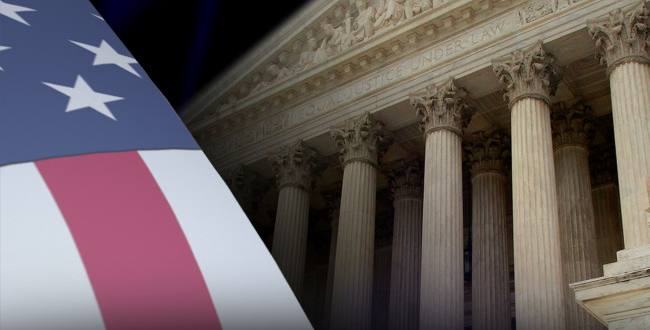Supreme Court to rule on Obama immigration orders
Published on January 19th, 2016
Josh Gerstein
January 19, 2016
Politico
The justices also added a question on whether Obama's action violated the Constitutional provision that he 'take care that the Laws be faithfully executed.'
The Supreme Court announced Tuesday that it will take up a case challenging the legality of President Barack Obama's executive actions aimed at granting quasi-legal status and work permits to up to five million people who entered the U.S. illegally as children or who have children who are American citizens.
The high court's widely-expected move gives Obama a chance to revive a key legacy item that has been in limbo for nearly a year, since a federal judge in Texas issued an order halting immigration moves the president announced just after the 2014 midterm elections.
The justices are expected to hear arguments on the issue in April and to hand down a ruling by the end of June. Illegal immigration has already been a hot topic in the presidential contest, but the high-profile attention brought on by the Supreme Court fight could amp up the debate even further as the campaign plays out this spring and summer.
If the court rules in Obama's favor, his administration will have a relatively short, seven-month window to try to roll out the expanded Deferred Action for Childhood Arrivals program and the new initiative called Deferred Action for Parents of Americans. While advocacy groups are eager to have illegal immigrants apply for the programs, there are questions about how many will do so if they're debuted or expanded so close to the end of Obama's presidency.
The calculation of whether to apply may depend, in part, on the state of the presidential race and whether whoever is atop the field seems likely to continue Obama's policies. Since the moves are executive actions, they could be quickly rescinded and most of the major Republican candidates have pledged to do just that.
The lawsuit the justices agreed to hear was brought by Texas and 25 other states claiming they would be harmed by Obama's executive actions.
In February, Brownsville, Tex.-based U.S. District Court Judge Andrew Hanen issued an injunction barring the Department of Homeland Security from moving forward with the DAPA and expanded DACA programs. Hanen suggested Obama lacked the legal power to undertake such vast changes in the immigration landscape without congressional involvement, but the judge based his ruling on the narrower, more technical ground that the changes were never formally proposed as regulations and put through the public-notice-and-comment process under federal law.
In November, the 5th Circuit U.S. Court of Appeals refused to disturb Hanen's nationwide injunction. The 2-1 decision actually went further than the lower court ruling and held Obama's actions unlawful.
Later that month, the Justice Department asked the justices to take up the case.
The Supreme Court agreed Tuesday to entertain four legal questions raised by Obama’s immigration action.
Three of the questions were laid out by the Justice Department in the petition asking the justices to take up the case: whether states create legal standing to challenge the deferred actions grants by providing benefits to such immigrants, whether the actions Obama ordered in 2014 were arbitrary and capricious under federal law, and whether the administration was obliged to go through a formal notice-and-comment period before proceeding with its plan.
The fourth question, added by the justices in their Tuesday order, is whether Obama’s actions violated the Constitutional provision requiring him to “take care that the Laws be faithfully executed”—in essence, whether existing law bars the president from making the kinds of enforcement changes he sought to make.
The 26 states backing the lawsuit the court will take up argue that Obama did breach his duty to "take care" that the laws are enforced and that his actions amounted to a power grab that violated "the Constitution’s separation of powers more generally."
While those states urged the Supreme Court not to take the case and to let the lower court rulings stand, Texas Attorney General Ken Paxton said the high court's move reflected the important roles of the three branches of government.
“In deciding to hear this case, the Supreme Court recognizes the importance of the separation of powers," Paxton said in a statement. "As federal courts have already ruled three times, there are limits to the President’s authority, and those limits enacted by Congress were exceeded when the President unilaterally sought to grant ‘lawful presence’ to more than 4 million unauthorized aliens who are in this country unlawfully. The Court should affirm what President Obama said himself on more than 20 occasions: that he cannot unilaterally rewrite congressional laws and circumvent the people’s representatives.”
Not all states agree with Texas's stance. The attorneys general of 15 states and the District of Columbia filed a brief with the Supreme Court last month arguing that Obama acted within his legal authority.
A Justice Department spokesman declined to comment on Tuesday's action by the high court. The White House did not immediately respond to a request for comment.
Neither the lawsuit nor the injunction directly involve the first version of the DACA program for so-called Dreamers that Obama set up in 2012. However, if the Supreme Court holds Obama did not have authority for his more expansive moves in 2014, the administration would likely have to shut down the earlier program, which has granted quasi-legal status and work permits to about 788,000 people.





